Hazrat Baba Bulleh Shah Sarkar R.A
Bullay Shah Punjabi Poetry, Baba Bullay Shah Heart touching Poetry,
Who Is Bulleh Shah?
Hazrat Baba Bulleh Shah Sarkar R.A is believed to had been born in 1680, in the small village of Uch, Bahawalpur, Punjab, in present-day Pakistan in which his father, Shah Muhammad Darwaish, changed into a Paish Imam (prayer leading individual) and instructor. Due to unknown motives, Shah Darwaish had to pass to Malakwal, a village in Sahiwal. Later, when Bulleh Shah changed into six years vintage, his circle of relatives moved to Pandoke, that's 50 miles southeast of Kasur. Bulleh Shah was schooled by his father, in conjunction with the opposite children of the village. Most episodes affirm that Bulleh Shah needed to paintings as a child and adolescent herder inside the village. Details of his education at Maulana Mohiyuddin's reputed madrassa are less known however it's far confirmed that he received his higher schooling in Kasur. Some historians declare that Bulleh Shah received his training at a rather reputed madrassa run by using Hafiz Ghulam Murtaza wherein he taught for sometime after his graduation. He likely was given into better training the way many proficient individuals have done from antiquity to at the present time.
The 18th century was one of the most troubled times in Punjab: the Mughal empire was declining and there were uprisings all around
For Bulleh Shah taking an Arain as his Murshid was an act of declassing, or surrendering his ego and negating the ingrained caste system. He was probably the only classical Punjabi who openly expressed ishq (love) for his Guru. Inayat Qadri's alienation with Bulleh Shah is a much-talked-about myth in which it is claimed that he had to learn dancing and went back to his Murshid dancing in female attire. The cue of this myth is taken from Bulleh's famous Kafi: " Tere ishq nachaiya kar ke thayya thayya" (Your love made me dance beat by beat). This is a nice and beautiful story about performing arts professionals but most probably Bulleh Shah wrote this Kafi in a trance of several Persian Ghazals that were favorites among Chishti-Qadria circles. Ghazals written by Usman Harooni, guru of Moeen-ud-Din Chishti Ajmairi (founder of the Chishtia order in India) which was written about six centuries before Bulleh Shah was born, is almost identical. Bulleh Shah gave a unique indigenous color and flavor to Harooni's Persian ghazal, which opens with the verses:
I don't know why I start dancing the moment I see you/ But I am proud of myself that I dance in front of my friend/ I am Usman Harooni, a friend of Mansoor [Hallaj]/ People taunt and degrade me but I keep dancing for you on the altar.
There is a corollary to the fiction mentioned above. In it, Bulleh Shah, like his Murshid, is forced to leave Kasur for Lahore, banished by the extremely conservative Sunni Afghan rulers of Kasur. A dancing woman, Muradi Begum, gave him refuge and taught him dancing, as the story goes. It is more likely that Kasur's rulers threw him out of the city because of his defiant lifestyle, but the refuge provided by Muradi Begum is not doubtful. It is more likely that Muradi Begum, wife of Punjab Governor, Amir Munno Muin-ul-Mulk who ruled Punjab from 1748-1753 may have helped Bulleh Shah because Lahore was a much more tolerant city. Probably, Muradi Begum is the first woman during the Mughal period who first started ruling Punjab under the name of her infant son after Munno's death in 1753 and then directly under her own name. She may have helped Bulleh Shah during her own or her husband's reign.
The rift between Bulleh Shah and Inayat Qadri has been a topic of discussion in their admirers' circles. Scrutinizing several sources, it looks more probable that Inayat Qadri's son-in-law visited Bulleh Shah in Kasur and later could not give him proper attention because he was busy making arrangements for the wedding of his teacher's daughter. Inayat Qadri's son-in-law complained that Bulleh Shah did not do properly host the guests because he considered himself better than the Arains visiting him. It is likely that upon hearing his, Inayat Qadri got upset and started keeping Bulleh Shah at a distance. Feeling the pain of this Bulleh Shah referred to it in his Kafi: 'O my love I made a mistake by not going along with you.' Besides personal difficulties, Bulleh Shah's period was extremely unsettling.
He spent his early life in Aurangzeb's era. He also witnessed the war of succession between Aurangzeb's three sons, Muazzam (known in history as either Bahadur Shah I or Shah Alam), Azam and Kambakhsh. Muazzam did the same to his two brothers and their families that Aurangzeb had done to his own siblings. Muazzam's mother was a Hindu Rajput: despite being extremely conservative, Aurangzeb's traditional queen Nawab Bai Begum Saheba was the daughter of the Raja of Rajauri (Jarral Rajput). It is also interesting that Bahadur Shah I was diametrically opposed to his father's Sunni faith: he was a Shia. One can see the weirdness of the ruling Mughal family's genealogy and religious variations under which people had to survive.
Bahadur Shah made peace with the rising Sikh movement but his reign lasted only four years (1707-1711) and the latter resumed guerilla war during Bulleh Shah's life. Apparently, Punjab was in turmoil due to Sikh incursions and frequent invasions of Ahmad Shah Abdali which made this verse popular: " Khahda peeta lahe da te baqi Ahmad Shahe da" (Consume as much as you can because the rest is going to be taken away by Ahmad Shah anyway). Bulleh Shah lamented the destruction of Punjab by saying that " Bura haal hoia Punjab da..." (Punjab's conditions have worsened).
The 18th century was one of the most troubled times in Punjab: the Mughal empire was declining and there were uprisings all around. However, this was the period in which the greatest literature of Punjabi, Sindhi, and Urdu was created. Shah Abdul Latif Bhitai (1689-1752) was Bulleh Shah's contemporary while his lifespan also overlapped with Waris Shah (1722-1798), Abdul Wahab (1739-1829), better known by his pen-name, Sachal Sarmast, and Urdu poets such as Mir Taqi Mir (1723-1810), Khwaja Mir Dard (1721-1785) and Nazeer Akbarabadi Nazeer (1740-1830). However, instead of reflecting the gloom of the declining Persian aristocracy that was visible in Urdu poetry of the time, Bulleh Shah is upbeat as we see in his Kafi: " Ishq di navion navin bahar" (Love is blooming on every turn).
Available collections of Bulleh Shah's poetry are tainted by Kafis and verses which do not seem to be his own. There were probably many other poets, devotees, and singers who put their own creations under his name. Several Kafis are totally based on Shah Hussain's verses with little alteration or addition. And, it is obvious that a poet of Bulleh Shah's calibre would never plagiarize another poet. Some Kafis are so repetitive and carry religious themes that are more likely written by a lower-level poet. In addition, many singers use Bulleh Shah's name for Sultan Bahu's anti-Mullah baits. Bulleh Shah is taken to be a major representative of anti-Sharia themes and his predecessors' work is also credited to him. Therefore, it is extremely difficult to sort out Bulleh Shah's authentic Kafis, requiring the reader to be very diligent.
Bulleh Shah's poetry takes the reader to a slippery slope where, sometimes, lyricism, simple vocabulary and use of popular folk symbols are so enchanting that they do not press the reader into exploring their deeper meaning. Due to its lyricism and apparent simplicity, explaining Bulleh Shah's poetry is the hardest for a literary critic and hence it has prompted some to say that Bulleh Shah is an overrated poet. It looks like Bulleh Shah's simplicity may have encouraged many to add their own poetry to his name. The fact of the matter is that Bulleh Shah is very subtle and philosophically very articulate if one starts scratching beneath the surface.
Bulleh Shah further honed the philosophical contours of Punjabi intellectual discourse. His predecessors had been alluding to determinants of history in symbols like Shah Hussain's ' Rab da bhana' (God's wish). Bulleh Shah clearly established that human relations and consciousness are determined by historical conditions. In the verse ' hukam hazoroon' (orders from the Supreme) he affirmed the concept of a pre-determined historical process but also unearthed the dynamics of change where the weakest can conquer the most powerful. Bulleh Shah was witnessing the declining Mughal empire, its ruling elites' downfall while the Sikh movement was rising. ' Bhurian wale raje keete' (the blanket-wearing people are becoming rulers) is understood to be a reference to Sikh guerillas which comprised the artisans and poorest section of the Sikh Jatts of Punjab. Some Sikh literary critics have interpreted Bulleh Shah's symbol of "Bhurian wale" as a slight but they fail to understand that Sufis preferred "Bhura" over the Mullah's white sheet. Though Sikhs had not captured state power by then, Bulleh Shah's sharp eyes could see where history was heading.
Bulleh Shah aptly discovered the basic contradictions of the society that were reflecting in religious differentiation. The following verse highlights his understanding of the essence of conflicts among people: 'Somewhere he is called Ramdas and elsewhere Fateh Muhammad/This dispute is from eternity/Once the quarrel between them was settled/ Something else came out of it.'
Bulleh Shah took symbols and metaphors like Heer-Ranjha, charkha, weaving, etc. and expanded them. He gave them new dimensions and deepened the philosophical discourse. Through Heer-Ranjha's metaphors Bulleh Shah broadened the concept of unity that was much closer to Advaita Vedanta:
'When I learned the lesson of love, I got scared of the mosque/I ran into the Hindu seminary where several horns are blown/ There Heer and Ranjha became one/ Heer was mistakenly searching for Ranjha in the jungle while he was right in her lap/ I lost all [worldly] awareness.'
Ranjha Ranjha kardi ni mein aape Ranjha hoi (Uttering 'Ranjha' over and over, I have become Ranjha myself)
Bulleh Shah was very hard on Mullahs and Pundits and took an unprecedented defiant posture: 'You [Mullah] wasted your life in the mosque/ Your inner side is filled with filth/You never stood for prayer of unity/ Now why are you making loud noises? You stay awake but dogs are also awake at night!'
After negating the Mullah, Bulleh Shah defiantly declares: 'Burn the prayer mat and lota [earthen pot]/ Don't take the prayer rosary and holy stick/Lovers are announcing over and over/Leave the kosher and eat non-kosher.'
'Oh Bullah drink wine and eat kebabs, burn the fire of your bones under [them].'
'Loot God's abode/, Rob the robber of all robbers.'
Some historians claim that when Bulleh Shah died in 1757, Mullahs refused to lead his funeral prayer. Bulleh Shah would not have cared about it at all!
Chal Way Bullehya Chal O'thay Chaliyay
Jithay Saaray Annay
Na Koi Saadee Zaat PichHanay
Tay Na Koi Saanu Mannay
O' Bulleh Shah let's go there
Where everyone is blind
Where no one recognizes our caste (or race, or family name)
And where no one believes in us
Parh parh ilm te faazil hoya
Te kaday apnay aap nu parhya ee na
(You read to become
all knowledgeable
But you never read yourself)
You read so many books
to know it all,
yet fail to ever read your
heart at all.
Bhaj bhaj warna ay mandir maseeti
Te kaday mann apnay wich warya ee na
(You run to enter temples and mosques
But you never entered your own heart)
You rush to holy shrines to play a part,
Would you dare enter the shrine of your heart
Larna ay roz shaitaan de naal
Te kadi nafs apnay naal larya ee na
(Everyday you fight Satan
But you never fight your own Ego)
You are quick to attack the evil one,
yet pride is a battle you have not won.
Bulleh Shah asmaani ud-deya pharonda ay
Te jera ghar betha unoon pharya ee na
(Bulleh Shah you try grabbing that which is in the sky
But you never get hold of What sits inside you)
You grab for a star you can control,
yet fail to grasp the light in your soul.
Bas kareen o yaar
(Stop it all my friend)
Let the race end, my friend
Ilm-oun bas kareen o yaar
Ik Alif teray darkaar
(Stop seeking all this knowledge my friend
Only an Alif is what you need)
Stop trying to be the one who knows,
for ‘God is One’ you need to know.
Bas kareen o yaar
(Stop it all my friend)
End the race, my friend
Allah Sayyaan Allah Sayyaan
(God is the Master, God is All)
God is All we need! God is All!
Nee main jaanaa Jogi de naal
(I shall follow the Yogi {ascetic/sufi})
Follow the wandering dervish!
Jo naa jaane, Haqq ki taaqat
Rabb naa devey us ko Himmat
(Those who deny the Strength of Truth
Lord does not give them courage)
If you deny the power of all that’s true,
God will not grant strength to you.
Hum Mann ke darya mein doobey
Kaisi nayya? Kya manjhdhaar?
(We have drowned in the river of Self
the boat and the flowing waters do not matter)
We are lost in this river of self,
no boat or streams are of any help.
Bas kareen o yaar
(Stop it all my friend)
End the race, my friend
Ilm-oun bas kareen o yaar
(Stop seeking all this knowledge my friend)
Stop trying to know it all, my friend.
Allah Sayyaan Allah Sayyaan
(God is the Master, God is All)
God is All we need! God is All!
Bulleh Nu Samjhawan Aaiyaann Bhaena Tey Bharjayee-yan
Man Lay Bulleya Sada Kena, Chad Day Palla Raaiyan
بلھے نوں سمجھاون آئیاں، بھیناں تے بھرجائیاں
من لے بلھیا ساڈا کہنا، چھڈ دے پلّا رائیاں
Bulleh Shah’s sisters and sisters-in-laws came to convince him.
Bulleya, please do as we tell you and leave the Arain’s (his guru’s) company.
آل نبی اولادِ علی نوں، توں کیوں لیکاں لائیاں
Aal e Nabi Ullad e Ali, Nu Tu Kyun Lee-kaan Laiyaan.
You are born into the family of prophet, you are heir of Ali,
So why do you ruin your family’s name like this.
جیہڑا سانوں سیّد سدّے، دوزخ ملن سزائیاں
جو کوئی سانوں رائیں آکھے، بہشتیں پینگھاں پائیاں
Jeyra Saanoun Syed Saday Dozakh Milay Sazaiyaan.
Jo Koi Saanu Raie Aakhe, Bhisti Peenghaan Paian.
Those who address me as Syed, shall be condemned to hell.
Those who address me as Raie, shall ride the swings in heaven.
آرائیں سائیں سبھنیں تھائیں، رب دیاں بے پروائیاں
سوہنیاں پرے ہٹائیاں نیں تے، کوجھیاں لے گل لائیاں
Raien, Saayin, Sabhin Thaayein, Rab Deyaan Bay Parwaaiyaan,
Sohniyaan Paray Hatayaan Tay, Khojeyaan Lay Gall Laiyaan.
Arain and masters are born at every place, God does not discriminate against anyone,
The lord is so carefree, That he neglects the beautiful (others) and hugs the ugly.
جے توں لوڑیں باغ بہاراں، چاکر ہوجا رائیاں
بلھے شاہ دی ذات کہہ پچھنایں، شاکر ہو رضائیاں
Jay To Lorain Baagh Baharaan ,Chaakar Ho Ja Araiyaan.
Bulley Shah Dee Zaat Kee Puchni, Shaakar Ho Razayaan.
If you seek the pleasure of a heaven in spring, go and become a servant of the Araiens,
O’ do not ask Bullah his caste; Be thankful and be content with the lord’s creation.
میرا یار گیا ہے رٹھ بلھیا،
مینوں ناچ سکھا دے اٹھ بلھیا،
مینوں سجدی نہیں سدھ پٹھ بلھیا،
تاہیں آن پئیں تیری گٹھ بلھیا،
وے توں کھول فقیر دی مٹھ بلھیا،
Mera Yaar Gya Ae Roth Bulya!
Menu Nach Shika De Uth Bulya!
Menu Suhjdi Nhi Sid Phut Bulya!
Ta Hi An Payena Teri Ghut Bulya!
We Tu Khol Faqeer Di Muth Bhulya!
Menu Nach Shika De Uth Bulya!
Menu Nach Shika De Uth Bulya!



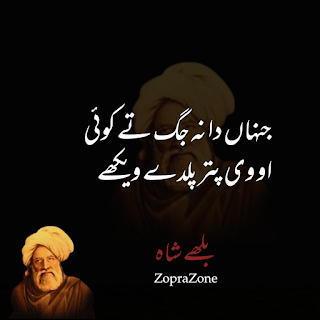
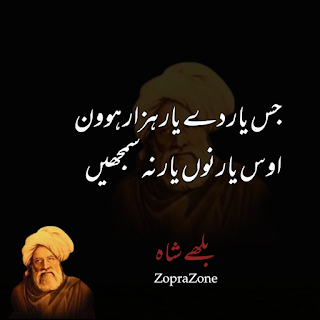
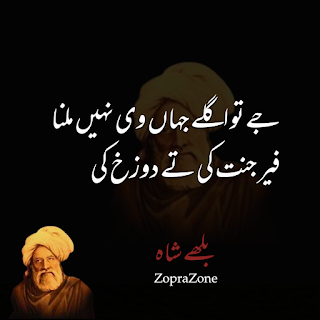
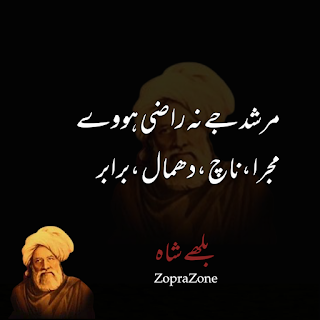
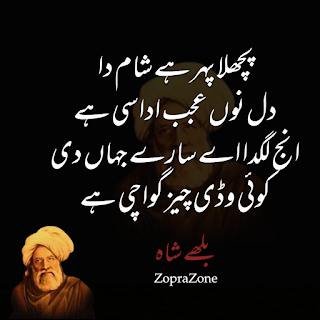
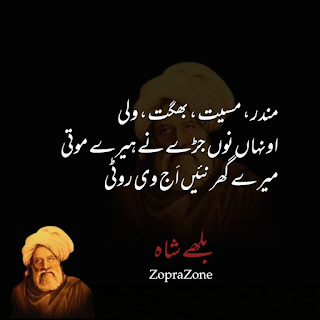
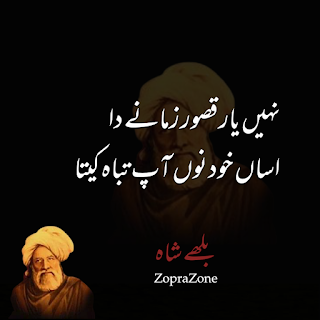
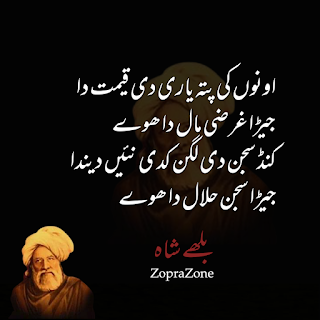
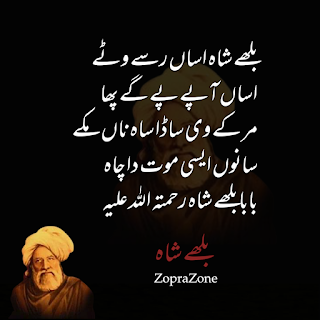
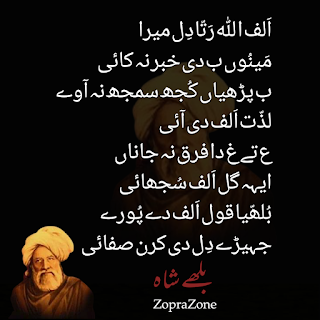
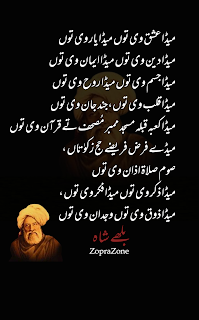
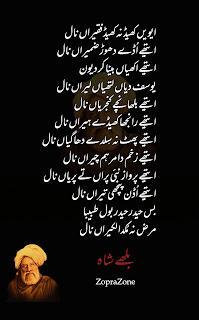
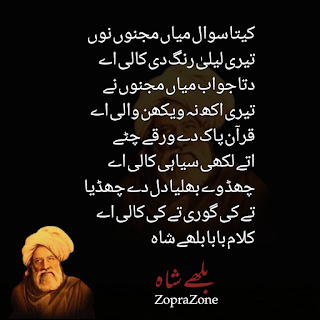
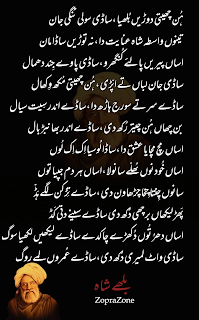









0 Comments